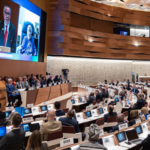
•Coalition working on largest ever study on haemorrhagic fever to better understand disease burden across West Africa
Richard Hatchett is an American oncologist and epidemiologist who serves as Chief Executive Officer of the Coalition for Epidemic Preparedness Innovations (CEPI). Hatchett was in Abuja, last week, to discuss CEPI’s work to support expanding vaccine manufacturing capacity on the African continent. Hatchett in an online interview with The Guardian said the company is rapidly developing one of the world’s largest COVID-19 vaccine portfolios – with CEPI-funded Moderna, Oxford/AstraZeneca, and Novavax now saving lives worldwide.
He said CEPI is co-leading COVAX to get vaccines to the world. COVID-19 Vaccines Global Access, abbreviated as COVAX, is a worldwide initiative aimed at equitable access to COVID-19 vaccines directed by the GAVI vaccine alliance, the Coalition for Epidemic Preparedness Innovations (CEPI), and the World Health Organization (WHO), alongside key delivery partner, United Nations Children Fund (UNICEF).
Hatchett said to advance Lassa fever vaccines (with three now in clinical trials), CEPI’s plans to license a Lassa vaccine for routine immunisation, and work on Enable – the largest ever Lassa fever study to better understand the disease burden across West Africa. Hatchett said the Nigeria Centre for Disease Control (NCDC) is CEPI’s lead partner for the Nigerian component of this study.
He said goals for the future to minimise future epidemic and pandemic risk includes CEPI’s ambitions to develop broadly protective coronavirus vaccines and reduce the timeline to create a new vaccine against a novel virus in just 100 days.
Is it possible to overcome all the constraints to enable Nigeria to manufacture vaccines locally? How do you intend to do that? Hatchett told The Guardian: “Over one year after the first COVID-19 vaccine was given, deep vaccine inequity persists. Today, only 12 per cent of people living in low-income countries have received a dose of vaccine compared to 62 per cent of the world’s population as a whole. It is clear that additional, globally distributed manufacturing capacity is needed to reduce the reliance of much of the world on just a few countries for vaccines.
“Africa currently imports around 99 per cent of the vaccines it uses, which makes it particularly vulnerable during a pandemic when the whole world needs vaccines at the same time and the countries which produce vaccines inevitably choose to protect their own populations first. We have seen this happen during COVID-19, and if we don’t take this opportunity to change the way the system is configured – to establish more geographically and equitably distributed manufacturing capabilities – we can be certain that the same thing will happen next time the world faces a pandemic. That’s why establishing sustainable vaccine manufacturing capacity in Africa is vital to the continent’s health security.
“Vaccine manufacturing is a complex endeavour, and we can’t underestimate the challenge of setting up new capacity in Nigeria. It isn’t simply a matter of building a factory: for manufacturing to be successful and sustainable, it needs to be situated within an enabling ecosystem. Manufacturing requires access to a trained and skilled workforce; predictable and sustainable financing; the core technologies of vaccine production; reliable supply chains; and experienced regulatory authorities. These will have to be strengthened in tandem with the construction of the actual manufacturing facilities.
“But I’m optimistic that Nigeria can overcome these challenges. Progress is already being made, as Nigeria was recently selected by the WHO as one of six African countries which will receive the technology needed to make mRNA vaccines – this is the same technology used in the highly effective Moderna and Pfizer vaccines, which are currently protecting Nigerians from COVID-19. This week, I had the pleasure of attending the Ports to Arms conference in Abuja, which focused on getting COVID-19 vaccines into arms in Africa, as well as preparing the continent for the next viral threat. I also had the honour of meeting with the Honourable Minister for Finance, Budget and National Planning, Mrs. Zainab Ahmed and the Honourable Minister for Health Dr. Osagie Emmanuel Ehanire. I was struck by how committed the Government of Nigeria is to developing a national vaccine manufacturing industry with the potential to improve Nigeria’s health security, contribute to vaccine confidence, and bring economic benefits to the country.
“Supporting the establishment of sustainable vaccine manufacturing in lower income countries is central to my organisation’s – CEPI’s – work to tackle future epidemic and pandemic threats, so we stand ready to support the Government of Nigeria. CEPI wants to contribute to the establishment of a global network of regional vaccine development and manufacturing facilities to enable vaccine production where and when it is needed in response to disease outbreaks, and I hope that the Nigerian vaccine hub will be part of this network in the future.
“I am also optimistic because at a global level, as well as at regional and national levels, we are seeing a convergence of political will, scientific innovation and mobilisation of finance that creates a rare opportunity to expand and diversify the global vaccine manufacturing footprint. It is incumbent upon national governments and the global community to seize this opportunity to build a world, which is better prepared to fight the next pandemic in a fair and equitable way.”
On plans towards stopping COVID-19, Hatchett said: “We know that vaccines break the link between infection with COVID-19 and serious illness or death. Vaccination is the best way to protect yourself and your family, take the sting out of the pandemic, and convert the virus into something we can live with, as unfortunately we will have to. When it comes to vaccines, we have two main priorities: the first is to vaccinate as many people as possible, as quickly as possible, wherever they are in the world. The second is to continue vital vaccine research so we have the right vaccines to control COVID-19 in the longer term, because this virus is not going to disappear, it will stay with us like influenza.
“My organisation, CEPI, co-leads the COVAX initiative, which is delivering vaccines to the world with a particular focus on lower income countries. So far, COVAX has delivered over 60 million doses of COVID-19 vaccine to Nigeria, but there’s still a long way to go. In 2021, the shortage of COVID-19 vaccines hampered the rollout of vaccinations in Nigeria and many other countries. Fortunately, the situation has now vastly improved, and the supply of vaccines is no longer the major bottleneck. Now the focus needs to be on getting those vaccines into people’s arms, which was the subject of the Ports to Arms Conference and one of the topics we and our partners Gavi, UNICEF, and WHO were exploring here this week. COVAX will continue to supply vaccines to countries that need them, and to support governments to reach their national vaccination targets.
“But viruses don’t stand still, they evolve and change so we need to be prepared for new variants to emerge that could evade our current vaccines. CEPI is thinking ahead and has already begun to invest in what we hope will be more durable and ‘variant-proof’ vaccines that are capable of protecting us even as the virus evolves, ideally without requiring frequent boosters. If we don’t develop such vaccines, we could find ourselves facing new waves of infection from different variants of the virus for years to come.
“COVID-19 has acted as a stark reminder of the devastation that infectious diseases can cause. It’s not the first pandemic of the 21st century, and unless we make major investments in bio-preparedness it certainly won’t be the last. At CEPI, we are dedicated to developing vaccines against new viruses, and to making sure those vaccines are available to protect the people that need them most. CEPI is developing vaccines against a range of infectious diseases where commercial markets have failed to deliver them, including Lassa fever, which of course is important here and across West Africa. We’re also working to prepare now for the next pandemic, in a way that leaves no country behind. As COVID-19 has demonstrated, emerging infectious diseases represent an existential threat to our way of life, so we must capitalise on the political will, practical experience, and technical and scientific progress emerging from the pandemic to prevent such devastation happening again.”













